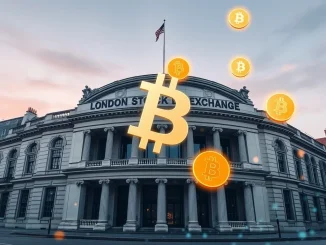
Something significant just happened in the Bitcoin world! Over the last day, a whopping 256 BTC were unstaked from Babylon, a protocol designed for Bitcoin staking. This movement, highlighted by Mononaut, a key figure behind Mempool, has sparked discussions about network activity and transaction costs. Let’s dive into what this Bitcoin unstaking event means for you and the broader crypto landscape.
What’s the Buzz About This Bitcoin Unstaking Event?
Imagine a digital bank where you’ve locked up your Bitcoin to earn rewards – that’s essentially what Bitcoin staking protocols like Babylon aim to achieve. However, recent data reveals a notable shift. In just 24 hours, users decided to withdraw a substantial amount of their Bitcoin from Babylon.
Here’s a quick breakdown of the key details:
- Amount Unstaked: 256 BTC
- Timeframe: 24 hours
- Protocol: Babylon (BABY)
- Total Fees Paid: 1.35 BTC
- Block Space Occupied: 1.318 MvB
- Source: Mononaut (@mononaut), Mempool Founder
This isn’t just a small fluctuation; 256 BTC is a considerable amount of Bitcoin to move in a single day, especially within the context of a specific protocol. The fact that these BTC unstaked transactions incurred significant fees and block space also raises important questions.
Why is Bitcoin Unstaking from Babylon Significant?
Several factors make this Bitcoin unstaking event noteworthy:
Network Activity Indicator
Large unstaking events can signal shifts in investor sentiment or protocol dynamics. It could indicate users are re-evaluating their staking strategies, perhaps seeking better opportunities elsewhere or adjusting their risk appetite.
Transaction Fee Implications
The 1.35 BTC in fees is a significant sum, highlighting the cost associated with on-chain Bitcoin transactions, especially during periods of network congestion. This underscores the ongoing discussion around crypto transaction fees and scalability on the Bitcoin network.
Babylon Protocol Dynamics
As a relatively new protocol, Babylon’s performance and user behavior are closely watched. This unstaking event could be a natural adjustment phase, or it might reflect specific factors related to the protocol itself, such as changes in staking rewards or perceived risks.
Block Space Utilization
The 1.318 MvB of block space used is not insignificant. Bitcoin’s block space is a limited resource, and events like this contribute to network congestion, potentially impacting transaction confirmation times and overall network efficiency.
Diving Deeper into Bitcoin Staking and Babylon Protocol
To fully grasp the context of this BTC unstaked event, let’s briefly touch upon Bitcoin staking and the Babylon protocol itself.
What is Bitcoin Staking?
Traditionally, Bitcoin’s proof-of-work mechanism doesn’t directly involve staking in the same way as proof-of-stake blockchains like Ethereum. However, innovative protocols are emerging to enable Bitcoin holders to earn rewards by participating in network activities. These methods often involve:
- Layer-2 Solutions: Utilizing technologies built on top of the Bitcoin blockchain to facilitate staking mechanisms.
- Sidechains: Employing separate blockchains that are linked to Bitcoin, allowing for more flexible functionalities, including staking.
- Protocols like Babylon: Developing novel approaches to leverage Bitcoin’s security for staking purposes, often related to securing other blockchains or services.
Babylon: Staking Bitcoin to Secure the Future?
Babylon is positioned as a protocol aiming to bring Bitcoin staking to the forefront. It focuses on using Bitcoin to enhance the security and functionality of other blockchain networks. The exact mechanisms can be complex, but the core idea revolves around leveraging Bitcoin’s massive market capitalization and security to provide staking opportunities.
Analyzing the Crypto Transaction Fees and Block Space Usage
The fact that these Bitcoin unstaking transactions incurred 1.35 BTC in fees and occupied a substantial amount of block space highlights crucial aspects of the Bitcoin network:
Crypto Transaction Fees: A Cost of Decentralization
Bitcoin’s transaction fees are dynamic and fluctuate based on network congestion. When demand to include transactions in blocks is high, fees tend to rise. This crypto transaction fees model is inherent to Bitcoin’s design, incentivizing miners to prioritize transactions and contributing to network security. However, high fees can also be a barrier for smaller transactions and raise questions about scalability for mass adoption.
Block Space: A Precious Commodity
Bitcoin’s block size is limited, currently around 1MB, although advancements like SegWit have increased effective block capacity. This limited block space means that every transaction competes for inclusion in a block. Events involving large numbers of transactions, like this Bitcoin unstaking event, can contribute to block space congestion and potentially drive up fees for everyone.
What Does This Mean for Bitcoin and Crypto Enthusiasts?
This Bitcoin unstaking event from Babylon serves as a reminder of several key takeaways for those involved in Bitcoin and the broader cryptocurrency space:
- Network Awareness: Keep an eye on network activity and transaction fee trends. Tools like Mempool, from Mononaut, are invaluable for real-time insights.
- Protocol Research: If you’re involved in Bitcoin staking or considering using protocols like Babylon, conduct thorough research. Understand the risks, rewards, and dynamics of these platforms.
- Fee Management: Be mindful of crypto transaction fees when moving Bitcoin on-chain, especially for larger amounts. Consider timing-sensitive transactions during periods of lower network congestion.
- Scalability Solutions: The ongoing development of Bitcoin scaling solutions, like the Lightning Network, is crucial for addressing transaction fee concerns and improving network efficiency.
Conclusion: Navigating the Evolving Bitcoin Landscape
The Bitcoin unstaking of 256 BTC from Babylon in 24 hours is more than just a number; it’s a data point that reflects the dynamic nature of the Bitcoin ecosystem. It highlights network activity, transaction cost considerations, and the ongoing evolution of Bitcoin staking mechanisms. As the crypto space continues to mature, understanding these events and their implications is crucial for making informed decisions and navigating the exciting, yet sometimes complex, world of Bitcoin and decentralized finance. Stay informed, stay curious, and keep exploring the ever-evolving world of crypto!



